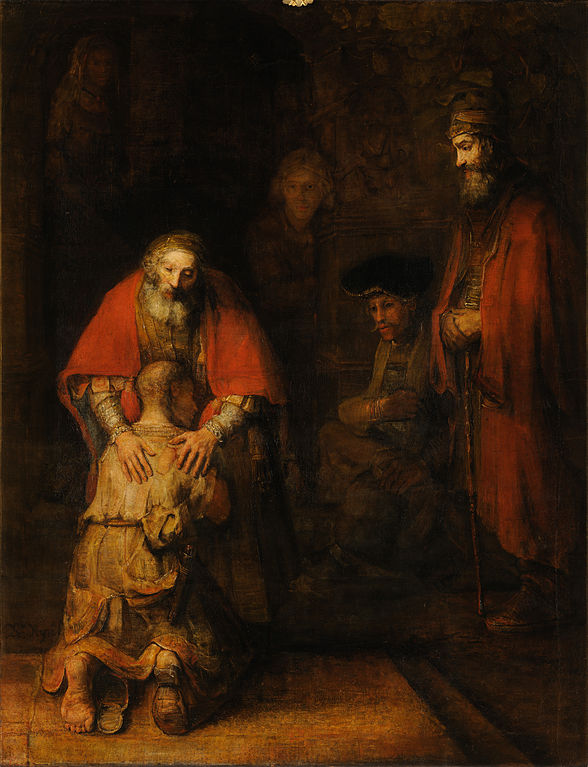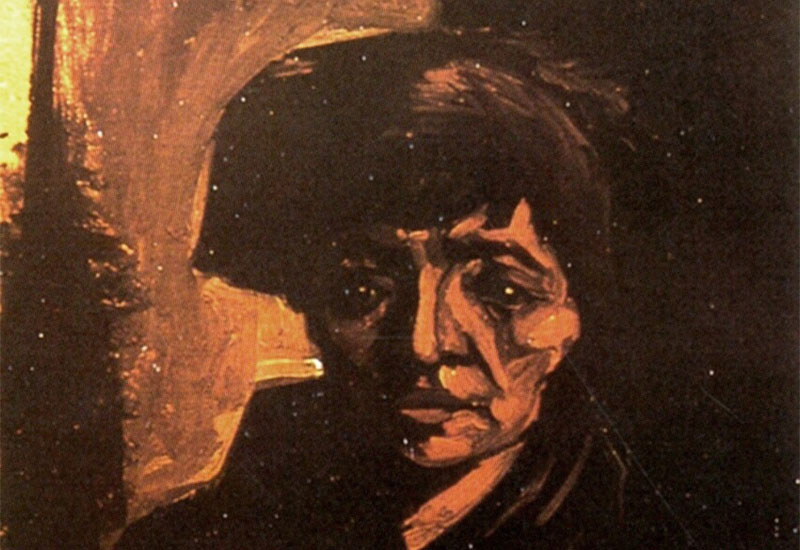A self-portrait of Vincent van Gogh has been found hidden behind one of his paintings. According to the National Galleries of Scotland, art conservators made the discovery, believed to be the first for a UK institution, during an X-ray examination of van Gogh’s 1885 work, “Head of a Peasant Woman.”
Van Gogh often reused his canvases and worked on their reverse as well. In this case, the X-ray showed “a bearded sitter in a brimmed hat with a neckerchief loosely tied at the throat. He fixes the viewer with an intense stare, the right side of his face in shadow and his left ear clearly visible.” The image was hidden behind cardboard and layers of glue.
Now experts are looking for ways to remove the glue and cardboard covering the self-portrait without damaging “Head of a Peasant Woman.” The X-ray image will be featured at an upcoming exhibition called “A Taste for Impressionism” at the Royal Scottish Academy in Edinburgh.
In other art news, the Dutch painter Rembrandt was born on this day in 1606. His rendering of the prodigal son’s return to the father is one of my favorite paintings of all time.

I will always remember the first time I viewed it at the Hermitage in St. Petersburg, Russia. I purchased a print of it in the museum’s gift shop; Janet framed the print, and it hangs in my office, where I can see it each day.
It depicts the prodigal in tattered rags kneeling as his father embraces him, his face filled with grace and mercy. The older brother stands to the side, a condemning look on his face.
Here’s the unseen question Rembrandt invites us to ask: If you were the prodigal, which of the two would you want to meet?
“The things that are unseen are eternal”
These stories have this fact in common: they remind us that unseen realities can be the most important realities of all. A priceless painting can exist whether we can see it or not. A transforming spiritual truth can emerge from a physical work of art.
Paul captured this principle in his declaration, “This light momentary affliction is preparing for us an eternal weight of glory beyond all comparison, as we look not to the things that are seen but to the things that are unseen. For the things that are seen are transient, but the things that are unseen are eternal” (2 Corinthians 4:17–18).
Let’s consider three reasons we should focus on “the things that are unseen” today.
One: God’s unseen presence brings strength we can find nowhere else.
Prior to his return to heaven, Jesus promised his first followers, “I am with you always, to the end of the age” (Matthew 28:20). They would no longer see him in the flesh, but the fact that he would no longer be confined to a single human body meant he could be present in his Spirit in each of their bodies and lives (1 Corinthians 3:16). He could intercede for each of them and for each of us (Romans 8:34). When we turn to the God we cannot see, we find strength to face the challenges we can.
This prayer by John Keble (1792–1866) is therefore appropriate for us to pray today:
Sun of my soul, Thou Savior dear,
It is not night if Thou be near;
Oh, may no earthborn cloud arise
To hide Thee from Thy servant’s eyes!
Two: Living for the unseen eternal brings purpose in our temporal lives.
Paul testified, “For me to live is Christ, and to die is gain” (Philippians 1:21). This fact emboldened him to serve the Philippians (vv. 24–26), knowing that the worst that could happen to him leads to the best that could happen to him.
The Scottish minister and theologian John Baillie composed A Diary of Private Prayer with prayers for each morning and evening of the day. I have been praying them for some time, always with great profit. In this morning’s prayer we find these words:
Let me remember that my mortal body is only the servant of my immortal soul;
Let me remember how uncertain my hold is on my own physical life;
Let me remember that here I have no continuing city, but only a place for a brief stay, and a time for testing and training;
Let me use this world without abusing it;
Let me be in this world but not of it;
Let me be as though I have nothing, and yet possess everything;
Let me understand the vanity of what is time bound and the glory of the eternal;
Let my word be centered not in myself, but in you.
Three: Living for the unseen world frees us to serve this world well.
When our eternal status is secure with God, we no longer need the applause and affirmation of this fallen world. We seek God’s “well done” as our eternal reward (Matthew 25:21). As a result, we are free to love and serve others whether they love and serve us or not.
Henri Nouwen: “We can really be in the world, involved in the world, and actively engaged in the world precisely because we do not belong to it, precisely because this is not where our dwelling place is. Precisely because our home is in God, we can be in the world and speak words of healing, of confrontation, of invitation, and of challenge.”
C. S. Lewis advised us, “Aim at heaven and you get earth ‘thrown in.’ Aim at earth and you get neither.”
At what are you aiming today?



